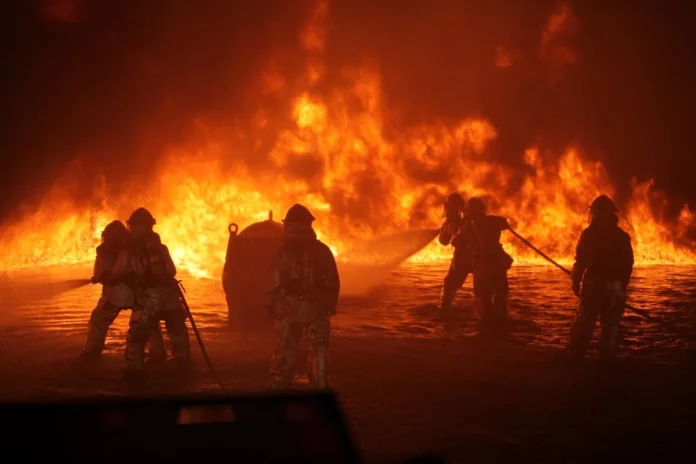Every year, wildfires in the US and around the world do damage worth billions of dollars. At the same time, thousands of lives are lost, and millions are displaced from their homes.
Thus comes the need for authorities to minimize the damages sustained due to wildfires, and here’s how this can be achieved.
Prescribed Burns and Fuel Reduction
According to the North Carolina State University, prescribed burns and fuel reduction techniques are very proactive and effective for reducing wildfire damage. Prescribed burns involve deliberately setting controlled fires to clear out flammable underbrush, dead vegetation, and small trees. This practice reduces the buildup of combustible materials in forests and reduces the likelihood of larger, more destructive wildfires.
Authorities can work with forest management agencies and local communities to develop and implement prescribed burn programs. These burns can be scheduled during times when weather conditions are most favorable for controlling the fire, ensuring it doesn’t get out of hand.
By reducing the available fuel, the intensity of wildfires is diminished. This, in turn, makes it easier for firefighters to manage and protect communities and natural habitats.
Enhanced Firebreaks and Defensible Spaces
Firebreaks are critical in protecting communities from wildfires. Authorities should invest in creating and maintaining firebreaks in fire-prone areas.
As explained by the National Park Service, firebreaks are wide, cleared areas that act as a barrier, slowing down the progression of a wildfire. These barriers provide firefighters with a safer zone from which to defend homes and infrastructure.
Additionally, homeowners should be encouraged to create defensible spaces around their properties. These spaces involve clearing vegetation, creating buffer zones, and using fire-resistant building materials to minimize the risk of their homes catching fire.
Authorities can provide incentives and guidelines to help residents develop effective defensible spaces. This can significantly reduce the risk of property damage during a wildfire.
Early Warning Systems and Communication
AP News reports how communication failure led to a lot of the chaos that ensued due to the recent Maui wildfires. County officials failed to sound the sirens and warn the locals of the approaching flames.
Hence, timely warnings and effective communication are key to mitigating wildfire damage. Authorities should invest in modern early warning systems that can detect and track wildfires in real-time.
These systems can include weather monitoring, satellite imagery, and on-the-ground sensors. Once a wildfire is detected, rapid communication with local communities and relevant agencies is crucial.
Evacuation plans and routes should be well-established and communicated to residents well in advance. Authorities must also use various communication channels, like social media and emergency broadcasts, to keep the public informed about the situation. That way, people can know about the state of the wildfire, evacuation orders, and safety precautions.
Firefighting Resources and Coordination
Effective firefighting is essential for minimizing wildfire damage. Authorities should invest in firefighting resources, such as equipment, aircraft, and trained personnel. Moreover, interagency coordination is vital to ensuring a rapid and efficient response to wildfires.
Local, state, and federal agencies, as well as volunteer firefighting organizations, need to work together seamlessly. This includes sharing resources, information, and expertise.
When choosing resources, authorities must prioritize the safety of the first responders, which in this case are the firefighters. For that, they must invest heavily in safety equipment. They must also avoid purchasing resources that might harm firefighters down the line. Checking this box in the list became very necessary after the AFFF foam lawsuit.
According to TorHoerman Law, the AFFF lawsuits were filed against manufacturers of the AFFF firefighting foam. It was observed that AFFF exposure led users to develop various types of cancer, including testicular cancer and kidney cancer. The presence of toxic chemicals in the foam was what was causing all this. Hence, authorities must exercise caution when buying chemical products for firefighters, like extinguishers and firefighting foam.
Community Education and Preparedness
Wildfire mitigation efforts should extend beyond just the authorities. Communities play a crucial role in minimizing damage. Authorities can support community education and preparedness programs to raise awareness about wildfire risks and teach residents how to protect themselves and their property.
This education can include fire safety measures and the importance of creating defensible spaces. Local community organizations and neighborhood watch groups can also be formed to provide support, share information, and coordinate actions during wildfires.
Climate Change Mitigation and Adaptation
While wildfire management strategies are vital, addressing the root cause of increased wildfire risk is equally important. Climate change is a significant driver of more frequent and severe wildfires. Rising temperatures and changing precipitation patterns are creating drier conditions and longer fire seasons.
To minimize wildfire damage in the long term, authorities should prioritize climate change mitigation and adaptation efforts. This includes reducing greenhouse gas emissions through policies that promote renewable energy and sustainable practices.
Additionally, investing in research to understand how climate change will impact local ecosystems and wildfire behavior is also worth it. This can help communities adapt and develop more resilient strategies.
Conclusion
Minimizing wildfire damage has become a necessity in many parts of the world right now. Hence, authorities need to act accordingly, especially by committing to the points discussed above. Only then will it be possible to minimize such damage and deal with this issue head-on.







